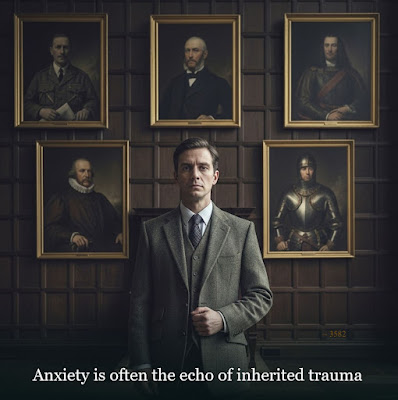Imagine the lives of those painted ancestors. The soldier likely faced the horrors of war. The man in armor, the brutality of ancient combat. Each, in their time, endured struggles, deprivations, losses, and perhaps even persecutions that left deep scars. These aren't just historical footnotes; they are deeply ingrained experiences that, according to this idea, can ripple through generations. It's almost as if the very air in that ancestral home, and within the man himself, carries the ghost of their suffering.
Epigenetics suggests that environmental factors, including severe stress and trauma, can actually cause changes in gene expression without altering the underlying DNA sequence. These "epigenetic tags" can then be passed down through generations. So, in a very real, biological sense, the trauma of your great-grandparent could potentially influence your own predisposition to anxiety, even if you never directly experienced their suffering. It's as if their body 'remembered' the trauma, and passed that 'memory' on.
If a family or a community has experienced profound collective trauma – war, famine, displacement, persecution – the coping mechanisms, fears, and even the silence surrounding those events can be unconsciously transmitted. Children absorb the unspoken anxieties of their parents, the caution born of past hardship, and the emotional patterns that emerged as survival strategies. This can manifest as generalized anxiety, a pervasive sense of unease, or specific phobias that seem to have no direct personal origin. It's the weight of untold stories, the unwept tears.
Philosophically, this touches on themes of legacy, fate, and the interconnectedness of human experience. It challenges the purely individualistic view of mental health, suggesting that we are not entirely self-contained islands of anxiety. Instead, we are nodes in a vast, intergenerational network of experience. It prompts us to consider how much of "us" is truly "us," and how much is an echo of those who came before. It’s a call to understand our roots, not just for genealogical curiosity, but for psychological liberation.
In an earlier aphorism i asked "What keeps us from mending all the torn families?" We have few systems that effectively address these kinds of health issues. And we doom our children to suffering by not mending more families.

No comments:
Post a Comment